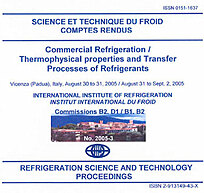
Document IIF
Expérience in situ avec le système de chauffage, ventilation et conditionnement d'air de l'institut flamand de biotechnologie à l'Université de Gand.
Field experience with the HVAC-system of the Flemish Institute for Biotechnology Building at the Ghent University.
Auteurs : PAEPE M. de, RAEYMAEKERS B., T'JOEN C.
Résumé
In 2003 a new advanced biotechnology laboratory building was opened at the Ghent University. Very high standards were demanded for the HVAC-installation. An energy survey was made of the whole building during 2003 and 2004, with special attention paid to the refrigeration equipment. Measurements showed a strong rise in energy use of the campus, after start-up of the building. Several measures were introduced to reduce energy use and related heat dissipation. The refrigeration system consists of two large electrical chillers cooled with two cooling towers and the possibility to use free cooling with a plate heat exchanger and the cooling towers if outside air temperatures allow it. The performance of the chillers was monitored. Measurements show that performance of the free cooling is disappointingly low. This is caused by bad design and suggestions are made for amelioration. Using DOE 2.6 a calibrated simulation of the building was run to compare with the measurement data and the design requirements. Expected energy use reduction is estimated to be 1%.
Documents disponibles
Format PDF
Pages : 2005-3
Disponible
Prix public
20 €
Prix membre*
Gratuit
* meilleur tarif applicable selon le type d'adhésion (voir le détail des avantages des adhésions individuelles et collectives)
Détails
- Titre original : Field experience with the HVAC-system of the Flemish Institute for Biotechnology Building at the Ghent University.
- Identifiant de la fiche : 2006-0881
- Langues : Anglais
- Source : Commercial Refrigeration. Thermophysical Properties and Transfer Processes of Refrigerants. Proceedings of the IIR International Conferences.
- Date d'édition : 30/08/2005
Liens
Voir d'autres communications du même compte rendu (140)
Voir le compte rendu de la conférence
Indexation
-
Outdoor air and groundwater as natural sources ...
- Auteurs : SORENSEN S. N.
- Date : 27/09/1993
- Langues : Anglais
- Source : Proceedings of the 1993 non-fluorocarbon insulation, refrigeration and air-conditioning technology workshop.
Voir la fiche
-
Eksperimentalno ispitivanje indirektnog slobodn...
- Auteurs : LAZZARIN R. M., LONGO G. A.
- Date : 03/12/2008
- Langues : Serbe
- Source : Zbornik radova. 39. Medunarodni kongres o grejanju, hladenju i klimatizaciji.
- Formats : PDF
Voir la fiche
-
Climate conditions and energy saving prospect o...
- Auteurs : YE D.
- Date : 09/09/1997
- Langues : Anglais
- Source : International Symposium on Air Conditioning in High Rise Buildings - 1997
- Formats : PDF
Voir la fiche
-
Open chilled-water systems for free cooling: a ...
- Auteurs : COAD W. J.
- Date : 1994
- Langues : Anglais
- Source : ASHRAE Transactions 1994.
Voir la fiche
-
Enhancement of free-cooling opportunities throu...
- Auteurs : OCEJO J.
- Date : 1994
- Langues : Anglais
- Source : ASHRAE Transactions 1994.
Voir la fiche
